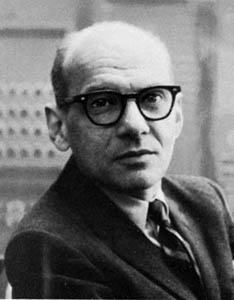 A few people asked me which works would I would recommend to serve as a starter course for Milton Babbitt’s work. That’s a tricky one: I’d say
A few people asked me which works would I would recommend to serve as a starter course for Milton Babbitt’s work. That’s a tricky one: I’d say
String Quartets Nos. 2 & 6
Partitions
Around the Horn
Piano Concerti
Philomel
All Set.
Any other suggested Babbitt samplers out there?
Here’s a wonderful essay in remembrance of Milton by David Rakowski.
Over at my blog File Under ? , I’ve shared some of my own memories of Milton.

I would think any overview of/introduction to Babbitt’s music should include “Three Compositions” if for no other reason than its historic import
…but I would also like to see it include “Transfigured Notes” in part due to the whole UNPLAYABLE (sic) hoopla but more for the subsequent proof that it not only is indeed playable, but wonderfully compelling music as well.
I shall miss him.
Composition for Viola and Piano! Great piece.
Phonemena
Whirled Series
Here’s an interview done with Babbitt onstage in San Francisco that might bring back some fond memories of the composer: http://radiom.org/detail.php?omid=SOM.1984.11.15.A.
http://WWW.RADIOM.ORG
In a program recorded ion November 15, 1984 as part of the San Francisco Exploratorium’s Speaking of Music series, Charles Amirkhanian interviews composer Milton Babbitt. Babbitt has taught at Princeton and Juilliard among other institutions; won numerous awards including a Pulitzer Prize Special Citation in 1982; and has several honorary doctorates. In this talk he describes in great scholarly detail the various techniques he has used in his compositions, and any serious student or pianist would be thrilled to hear what is essentially a free class in music theory given by one of America’s foremost professors. Joining Babbitt and Amirkhanian is pianist Alan Feinberg who plays a number of Babbitt’s works. Feinberg also explains why one of Babbitt’s pieces could not be played on the piano provided by the San Francisco Exploratorium, where this event was held, because the piano was made in 1895 and does not include several of the highest notes found on modern pianos, and which were essential for Babbitt’s works “Playing for Time” and “About Time”.
BTW, the outstanding contemporary soprano Rosemary Hardy performed Philomel last year and she told me that she’d love to do it again and even have it recorded. It’s extremely difficult.
I’d add his very recent, very delicate Concerti for Orchestra, too:
http://www.youtube.com/watch?v=TZt6Tfijspo
http://www.youtube.com/watch?v=LWGZE1cZfFQ
The Widow’s Lament In Springtime
Du
Mehr Du
Composition for Viola and Piano
Septet But Equal
Occasional Variations
Solo Requiem
The Bad Plus covered Semi-Simple Variations. In my experience, this band has been perfect for turning people on to experimental music:
http://www.youtube.com/watch?v=p-PJw2lqW7c
Ensembles for Synthesizer